In the process of experiencing loss and grief, it is important for a person to go through 5 stages: shock, anger, bargaining, depression, acceptance.
Each of them is important and worth devoting the necessary time to.
Let's look into all the details together with psychologist Ksenia Matur .

According to psychological canons, the period of residence is 1–1.5 years.
But in practice, this period can be different; a person can experience the stages out of order, go back, and go at his own pace.
It happens that there is no stage of denial or anger.
The stage of shock or denial
At this stage, a certain “freezing” of a person’s feelings and emotions occurs.
The person acts detached or as if nothing is happening, he may say: “This can’t be”, “I don’t believe it”, “Everything will be fine”, “Everything will pass”, “Everything is fine”.
Stage of anger
A person may look for someone to blame for what happened, may be angry at himself, those around him, and even the person to whom something happened (or who died).
Auto-aggression (aggression directed at oneself) often occurs; it can develop into a feeling of guilt and a desire to punish oneself.
Bargaining stage
Often at this stage a person tries to make a deal with God, higher powers, himself or someone else.
He thinks: “If I do this, everything will go back to its place, everything will be corrected”, “I will never again…”, “If it happens like this, I will never again…”.
Restrictions, rules, obsessions may appear, a person may punish himself and deny himself something in memory of the person or loss.
Stage of depression
It feels like powerlessness, nothing can be returned, the pain from anger does not go away, bargaining and restrictions also do not bring results.
A certain despair may set in, one may feel discouraged, and it may even seem that the pain will never go away, an unwillingness to live and do anything.
A person becomes indifferent to himself, others, his hobbies, work, everything that previously had meaning for him.
Acceptance stage
There is a desire to live, to do something, sensitivity and pleasant feelings (joy, pleasure) return, interest and desire awaken.
The pain does not subside, but the person learns to live with it.
Sadness remains, but he no longer "falls" into it. He returns to work, communication, hobbies. Often changes something in life - from wardrobe to moving, changing the environment.
It is important to live through loss. What does it mean to live through it?
Talk about it, cry, be sad, grieve. And the main thing is to do it with a person (not alone). Living and liberation happens only next to other people.
Therefore, it is important to enlist the support of loved ones, friends, and a psychologist.
So that no matter how much you talk about the person and the loss, they don’t stop you and say: calm down, forget it, it’s all over, you have to live on.
The loss is only experienced, and nothing else. Otherwise, all feelings and experiences simply get stuck in the body and then turn into frozen feelings and psychosomatics.
And over the course of many years, sometimes even a lifetime, when remembering this person, the pain returns.
When the loss has been lived through, there are memories, but there is no pain and you don’t want to cry.

